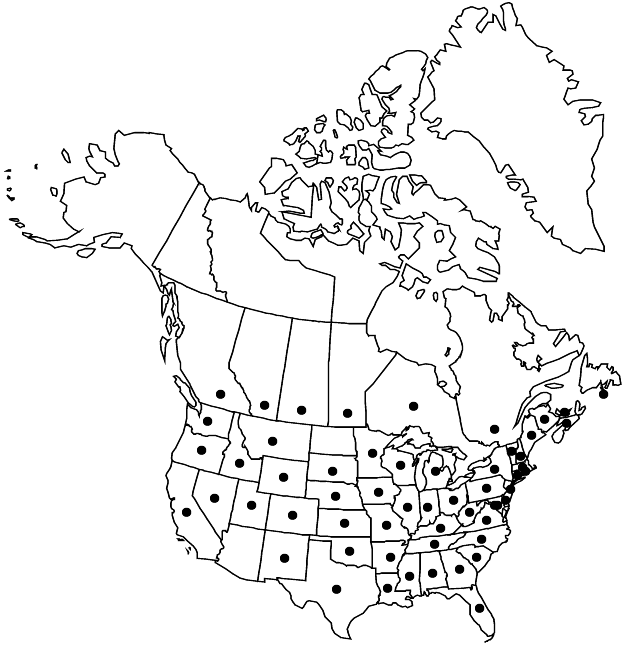Arenaria serpyllifolia
Sp. Pl. 1: 423. 1753.
Plants annual. Taproots filiform. Stems 1–100+, erect to ascending or sprawling, green, 3–40+ cm; internodes terete to ellipsoid, 2–8 times as long as leaves, dull, retrorsely pubescent throughout, sometimes also stipitate-glandular. Leaves often connate basally, with scarious or mostly herbaceous sheath 0.2–0.3 mm, petiolate (proximal leaves) or usually sessile; petiole 1–4 mm; blade 3–5 veined, elliptic to broadly ovate or rarely orbiculate, 2–7 × 1–4 mm, herbaceous, margins flat, herbaceous, dull, ciliate especially proximally, apex acute to acuminate, pustulate, sparsely minutely pubescent or glabrous; axillary leaf clusters absent. Inflorescences terminal, open, leafy, 3–50+-flowered cymes. Pedicels erect or ascending in fruit, 1–12 mm, retrorsely pubescent. Flowers: sepals green, often prominently 3-veined, not keeled, lanceolate to ovatelanceolate (herbaceous portion narrowly elliptic to broadly lanceolate), 2–3 mm, to 4 mm in fruit, apex narrowly acute to acuminate, ± minutely pustulate, stipitate-glandular; petals oblong, 0.6–2.7 mm, 1/5–3/4 times as long as sepals, apex obtuse to rounded. Capsules loosely enclosed by calyx, ovoid to cylindric-ovoid, 3–3.5 mm, 4/5–11/5 times as long as sepals. Seeds 10–15, ashy black, reniform, plump, 0.4–0.6 mm, not shiny, with low-elongate, prominent tubercules.
Distribution

Introduced; Alta., B.C., Man., N.B., N.S., Ont., P.E.I., Que., Sask., Ala., Ark., Calif., Colo., Conn., D.C., Del., Fla., Ga., Idaho, Ill., Ind., Iowa, Kans., Ky., La., Maine, Mass., Md., Mich., Minn., Miss., Mo., Mont., N.C., N.H., N.J., N.Mex., N.Y., Nebr., Nev., Ohio, Okla., Pa., R.I., S.C., S.Dak., Tenn., Tex., Utah, Va., Vt., W.Va., Wash., Wis., Wyo., North America, Eurasia, Africa, in Australia
Discussion
Varieties 3+ (2 in the flora).
Variation in Arenaria serpyllifolia in the broad sense is treated in various ways. The two varieties recognized here have been treated also as subspecies (e.g., A. O. Chater and G. Halliday 1993) or species (e.g., M. N. Abuhadra 2000; B. Jonsell 2001). Jonsell admitted that accepting them as species is questionable; while the morphological differences are slight (see esp. Abuhadra), the ploidy-level difference (2n = 40 in var. serpyllifolia vs. 2n = 20 in var. tenuior) is important.
Selected References
None.
Key
| 1 | Capsules ovoid to ovoid-conic, broader at base; seeds 0.5-0.6 mm | Arenaria serpyllifolia var. serpyllifolia |
| 1 | Capsules cylindric to cylindric-ovoid, not significantly broader at base (walls nearly straight); seeds ca. 0.4 mm | Arenaria serpyllifolia var. tenuior |
"/5-11/5timesaslongassepals" is not declared as a valid unit of measurement for this property.